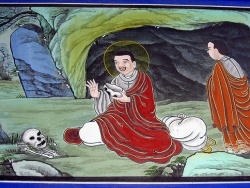Cāturmahārājika heaven
Catummaharajika-devaloka ("Four Great Deva Rulers of the Cardinal Directions")
Cāturmahārājikakāyika collectively refers to each of the four main directions seen above the horizon.
Buddhism speaks of Four Celestial Rulers or guardian devas, each of whom watches over one cardinal direction of the world.
They are named in association with their directional domains.
NORTH: Vessavaṇa (Kuvera),
SOUTH: Virūḷhaka,
EAST: Dhataraṭṭha, and
WEST: Virūpakkha.
Sanskrit caturmahārāja (चतुर्महाराज) "Four Kings" or Lokapāla "guardian of the world" reside in the Cāturmahārājika heaven on the lower slopes of the mythical Mount Sumeru, which is the lowest of the six worlds of the devas of the Sensuous-sphere (Kāma-dhātu).
They are the protectors of the world and fight inimical forces.
Each in his space command is able to muster a legion of demigods and other creatures.
All four are under Śakra (Pali, Sakka), the "king of kings,"
namely, the four Catummaharajika deva kings and the devas of the Heaven of the Thirty-three (Trāyastriṃśa).
On the 8th, 14th, or 15th days of each lunar month, the Four Heavenly Kings either send out messengers or go themselves to see how virtue (the key to rebirth in their world) are faring in the human world.
They then report the state of affairs to the assembly of Trāyastriṃśa devas.
Their concern is that they have sufficients ranks to repel the onslaughts of legendary enemies.
On orders of Śakra, the Four Great Kings and their retinues stand guard to protect Trāyastriṃśa (Tavatimsa, the Second Celestial World) from attack by the Asuras, which once threatened to destroy the sphere of the devas.
They are also vowed to protect the Buddha, the Buddha's message (Dharma), and the Buddha's followers from danger.
If there is any truth in this, it is said to be because Sakka is a Sotapanna (enlightened in the first of four degrees, an ariya or "noble disciple").

